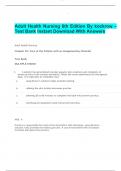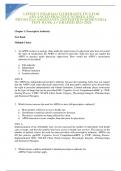Exam (elaborations)
Adult Health Nursing 6th Edition By kockrow – Test Bank Instant Download With Answers
- Course
- Institution
Adult Health Nursing 6th Edition By kockrow – Test Bank Instant Download With Answers Adult Health Nursing Chapter 03: Care of the Patient with an Integumentary Disorder Test Bank MULTIPLE CHOICE 1. A patient has generalized macular-papular skin eruptions and complains of severe ...
[Show more]




